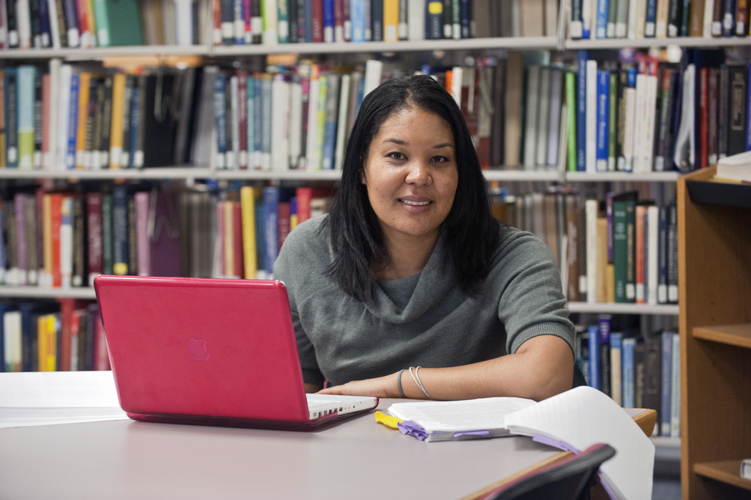
By
My thought is God has watched over me all this time, He’s not going to take me away from my kids. I rely on Him for everything, He gets me through the day, He gets me through the moment when all else fails, He’s there for me. Between God sending people in my life, strong powerful people like my counselors, my peers, my case managers, I wouldn’t be anything without these people. I ask for help quickly cause I knew it couldn’t have been done by myself.
The woman who said this to Graduate School of Social Work doctoral student Charu Stokes has many identities, including caregiver, churchgoer and GED student. She is also an HIV/AIDS patient.
The struggles accompanying these various roles is of great concern to Stokes, who for her dissertation undertook a study of 24 Boston-area African-American women — mostly single and ranging in age from 30s to 60s — coping with HIV/AIDS even as they provide care for their children or other family members. Stokes’ findings suggest that women in such situations use available health care services, but eschew programs that provide assistance for child and family care.
This project earned Stokes, a native of 29 Palms, Calif., two dissertation awards: the 2011 Jane B. Aron Doctoral Fellowship, awarded by the National Association of Social Workers Foundation to a social work doctoral candidate whose dissertation focuses on health policy and practice; and the Fahs-Beck Fund for Research and Experimentation, established with the New York Community Trust for Dissertation and Faculty Research in the Human Services.
“What with various medical advances, there’s a perception of HIV/AIDS now as a ‘manageable’ condition,” says Stokes, whose dissertation advisor is Donahue and DiFelice Professor Ruth McRoy. “But this overlooks the difficulties of living with HIV/AIDS, especially for certain populations. I decided to focus on African-American women because they are part of a population — African-American — that statistically faces the most severe HIV burden.
“African-American women in the 30-60 age group also tend to be primary caregivers. If you combine that characteristic with financial and other health-related stressors associated with African-American women, you have a complex scenario — one that has seldom, if ever, been studied before. How do they manage all this? What are their needs? That’s what I wanted to find out.”
The women Stokes interviewed generally made use of programs and services to assist them with health-related needs, such as obtaining health insurance or anti-viral medicines. But when it came to dealing with issues about caregiving, Stokes said, they tended to go it alone, or rely on family members, friends or other informal sources of support.
“There is a negative perception of child welfare services among these women,” said Stokes, who worked with Connell School of Nursing Associate Professor Rosanna DeMarco to find interviewees. “They used the services before, or were products of the system themselves, and their overall feeling is child welfare ‘doesn’t help families.’ Massachusetts is a national model in health care service delivery, but this study points up the need for more training and education in child welfare, to combat the negative perceptions around accessing services.”
Stokes was impressed by the tenacity and determination she saw in her interviewees. “These are resilient, resourceful and educated women who — despite health or personal-familial problems — are doing all they can to make their lives, and those of their families, better.”
Before entering the GSSW doctoral program, Stokes worked in diverse practice settings both in the US and abroad, serving as a substance abuse/mental health counselor, an intensive in-home services specialist, rape crisis counselor, crisis hotline counselor, and as a school-based clinician. Her international experience includes a year working in Malawi as a Save the Children Fellow and two years serving as a Peace Corps Volunteer in South Africa.



